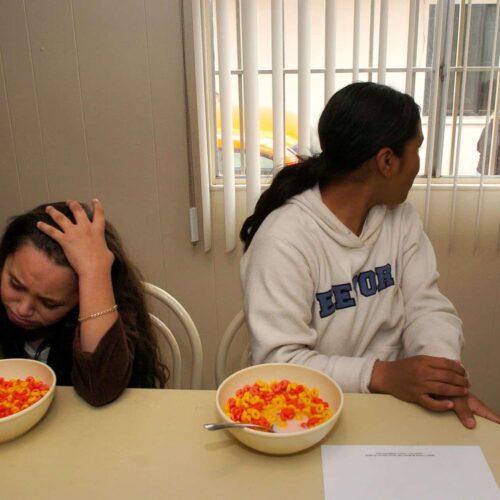Introduction
The surging number of unaccompanied Central American and Mexican child migrants represent a growing challenge for U.S. officials, who must weigh who gets to stay here — and who gets sent back to countries torn by violence, according to a new United Nations report, “Children on the Run.”
U.S. Border Patrol apprehensions of minors traveling on their own from three countries — El Salvador, Guatemala and Honduras — leaped from about 4,060 in 2011 to nearly 21,540 in 2013. The number of unaccompanied Mexican kids who were apprehended — and who are typically sent back over the border in a day or two — grew from 13,000 in 2011 to more than 18,750 in 2013.
“The narrative of international migration has changed,” said Leslie Velez, senior protection officer with the U.N. High Commissioner for Refugees’ U.S. regional office in Washington, D.C.
She spoke at an unveiling of the report Wednesday at the Migration Policy Institute, a nonpartisan research organization in Washington, D.C.
During or after October 2011, U.N. researchers interviewed more than 400 such minors who were between 12 and 17 years old and who had been held at some point in U.S. federal custody.
“No less than 58 percent of the 404 children interviewed were forcibly displaced because they suffered or faced harms that indicated a potential or actual need for international protection,” the report said. That’s compared to 13 percent of minors surveyed in 2006 whose stories suggested they were in need of international protection from violence.
Kids interviewed in 2011 said they fear armed criminal gangs, including drug cartels, and many kids from Mexico — 39 percent — said they feared recruitment into gangs involved in smuggling. Some minors from all countries expressed fear of violence in their own homes. The report urged careful screening of all these children to give them a fair opportunity to seek asylum from danger and prevent them from being returned to threatening conditions.
In 2011, the Center for Public Integrity reported on how screenings failed to identify and aid minors attempting to escape from drug gangs or sex trafficking rings bringing girls into the United States. A Mexican minor was eventually allowed to seek refuge, his pro-bono lawyer said, after being turned back by Border Patrol agents who suggested he return to Mexico and provide information about smuggling routes first.
In February, a report by Washington, D.C.-based Kids in Need of Defense, “Treacherous Journey,” outlined the challenge of trying to provide legal counsel to unaccompanied migrant minors whose numbers, if recent pace of growth remains steady, could reach 60,000 in 2014. The nonprofit group, known as KIND, organizes pro bono counsel for unaccompanied minors. The report was also authored by the Center for Gender and Refugee Studies at the University of California’s Hastings College of the Law.
“The U.S. government usually does not appoint counsel for unaccompanied children in immigration proceedings,” the KIND and Center report explains. “Without counsel, the children are unlikely to understand the complex procedures they face and the options and remedies that may be available to them under the law.”
Federal anti-trafficking law has required since 2008 that the Department of Health and Human Services — which shelters these kids when they are apprehended — “make every effort to utilize the services of pro bono counsel” to represent children in immigration proceedings free of charge.
Stories in the U.N’s “Children on the Run” reflect violence afflicting countries with some of the worst crime and murder rates in the world. Fifteen-year-old Maritza, from El Salvador, told researchers that a gang member warned her uncle that another man had his eye on her.
“In El Salvador, they take young girls, rape them and throw them in plastic bags,” Maritza is quoted saying. “My uncle told me it wasn’t safe for me to stay there and I should go to the United States.”
Seventeen-year-old Kevin, from Honduras, often identified as the world’s highest per-capita murder capital, is quoted telling researchers: “My grandmother is the one who told me to leave. ‘If you don’t join, the gang will shoot you. If you do, the rival gang or the cops will shoot you. But if you leave, no one will shoot you.’”
Read more in Inequality, Opportunity and Poverty
Immigration
Class-action suit: Wrong to put kids into immigration court with no lawyers to help
Kids in suit have no right to counsel to help plead their cases
Immigration
Will migrant kids lose access to child-welfare and legal specialists in rush to deport?
Minors in Center report were used by drug and sex traffickers but sent back


Join the conversation
Show Comments